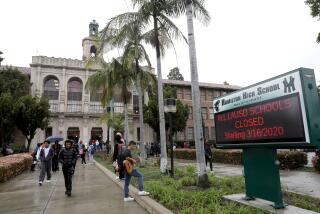Owners of San Diego Bonds Await Rebound
- Share via
Vultures are flying over the city of San Diego. But they’re finding slim pickings.
The city’s well-publicized fiscal woes are attracting investors who are looking for bargains among its bonds, say traders in the municipal securities market.
“Everybody remembers Orange County,” said Robert Gore, a municipal bond trader at brokerage Crowell Weedon & Co. in Los Angeles.
Indeed, some investors snapped up Orange County bonds at cheap prices after the county plunged into bankruptcy in 1994. The buyers were rewarded later as the bonds’ prices rebounded, when it became clear that the county would make all of its debt payments.
In the case of San Diego, however, bond bargain hunters -- often dubbed “vultures” because they’re looking to benefit from someone else’s misery -- can’t find much to buy, traders say.
That’s because the current owners of San Diego bonds, too, remember Orange County, analysts say.
Vultures “aren’t having much luck finding opportunities because it’s foolish to sell in this environment,” said Zane B. Mann, publisher of the California Municipal Bond Advisor newsletter in Palm Springs.
San Diego is struggling in part because it allowed promised benefits for workers to go unfunded in recent years, leading to a nearly $2-billion deficit in its pension plan. An independent report on the city’s finances this month was scathing, calling the city’s bureaucracy “an almost dysfunctional environment” that failed to address mounting problems.
Credit-rating firms have slashed or suspended the city’s debt rating. Moody’s Investors Service on Friday downgraded San Diego’s general obligation debt from Aa3 to A1 and cut the rating on two of its other financing instruments -- certificates of participation and lease revenue bonds -- from A2 to A3.
Even so, those lower ratings remain solidly investment grade. And “San Diego’s general obligation bonds are still rated higher than similar debt backed by the state of California,” Mann noted.
Moody’s rates the state’s general obligation debt A3, two levels lower than San Diego’s.
Mann said his monthly newsletter, a must-read for many conservative, buy-and-hold California muni bond investors, would tell subscribers in the next issue that San Diego’s financial situation might be a “mess,” but that bond owners needn’t worry.
“The downgrades may mean your bonds are worth less on paper, but individual investors who bought the debt for interest income won’t be hurt,” Mann said. “It’s difficult to imagine any scenario where debt payments would be disrupted. That’d be suicide for the city.”
Moody’s said it kept the city at investment-grade ratings “reflecting its healthy local economy, moderate debt profile and narrow but adequate reserves.”
The ratings firm said it “does not believe that the city is in danger of declaring bankruptcy.”
Opportunistic investors have been hoping that some individual holders of San Diego bonds might panic and dump their securities at discounted prices, muni bond traders say.
“We’ve had people say, ‘We want to buy it if it gets cheap,’ ” Gore recounted.
But so far, “we aren’t seeing waves of ‘bids wanted’ from retail investors,” said a trader at another investment house, who asked not to be identified. “Bid wanted” means someone is looking for a buyer for a bond.
The relative lack of supply makes it difficult to measure how much of a price discount San Diego bonds may be facing relative to other municipal securities, traders said.
The price of one San Diego general obligation bond maturing in 2010 has shown virtually no change in recent weeks, as tracked by Bloomberg News.
In any case, analysts noted that there often is a limited supply of muni bonds on the market at any moment. Many municipal bond investors are strictly buy-and-hold types: Once they purchase a bond, they expect to hold until it matures, earning interest along the way.
Muni bond interest is exempt from federal income tax. In California, interest paid on bonds issued by the state or its municipalities also is exempt from state income tax.
Some traders say investors have been asking about bonds from other entities that have the San Diego name -- such as the city’s school district -- but whose finances aren’t directly tied to the city’s.
The demand for San Diego-related bonds may reflect a general hunger for decent yields, analysts say, as long-term interest rates on other bonds, such as U.S. Treasury issues, have fallen to six-month lows in recent days.
More to Read
Inside the business of entertainment
The Wide Shot brings you news, analysis and insights on everything from streaming wars to production — and what it all means for the future.
You may occasionally receive promotional content from the Los Angeles Times.











